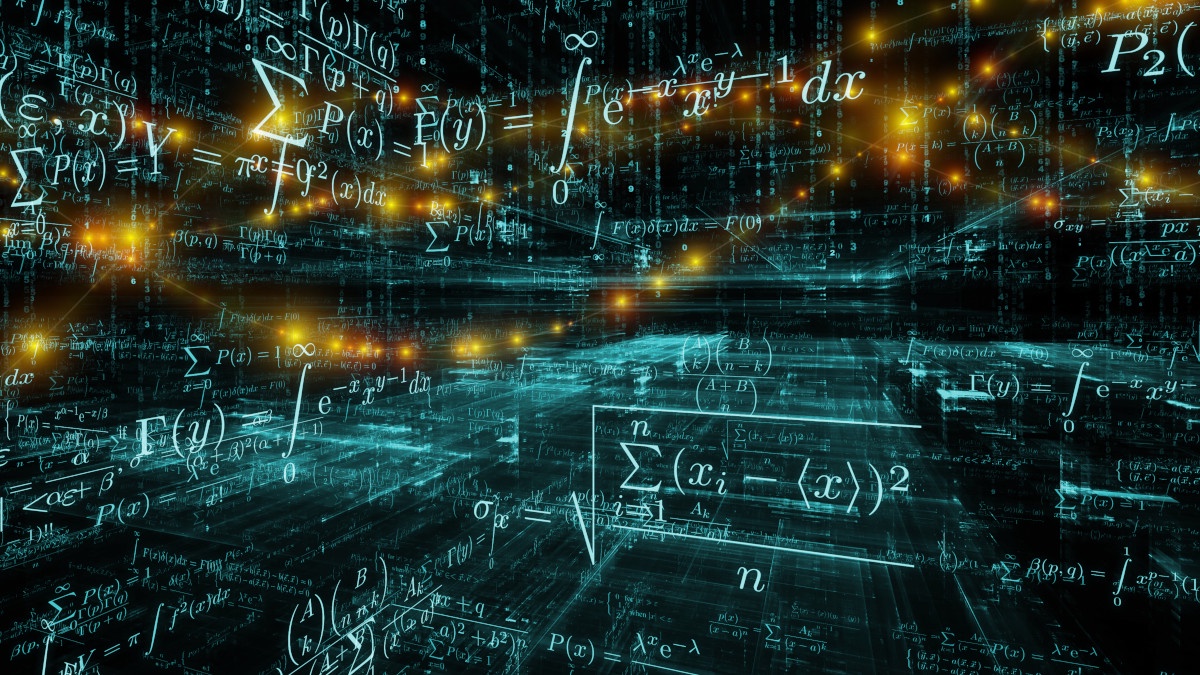Introduction
This degree is ideal for students who have a strong interest and skill in mathematics but want to understand the applied nature of it to the computing science industry.
Study Information
At a Glance
- Learning Mode
- On Campus Learning
- Degree Qualification
- BSc
- Duration
- 48 months
- Study Mode
- Full Time
- Start Month
- September
- UCAS Code
- GGK1
- Pathway Programme Available
- Undergraduate Foundation Programme

Many of the key computing processes and operations such as programming and data analysis are founded on the study and understanding of mathematical disciplines such as algorithms.
This degree combines elements from Mathematics and Computing Science to suit students who have a strong interest and skill in mathematics but want to understand the applied nature of it to the computing science industry.
This is an excellent combination of degrees that explores the very close relationship between computing science and mathematics.
Key core courses include; Calculus, Computer Architecture, Programming, Linear Algebra, Software Engineering and Algorithms, to name a few. These courses are complemented with a range of optional courses, such as; Knowledge Based Systems, Systems and Security, Operating Systems and Enterprise Computing.
Through course choices you can also choose to advance your knowledge in specific areas, such as Algebra.
What You'll Study
We will endeavour to make all course options available. However, these may be subject to change - see our Student Terms and Conditions page.
How You'll Study
Learning Methods
- Group Projects
- Individual Projects
- Lectures
- Research
- Seminars
- Tutorials
Assessment Methods
Students are assessed by any combination of three assessment methods:
- coursework such as essays and reports completed throughout the course;
- practical assessments of the skills and competencies learnt on the course; and
- written examinations at the end of each course.
The exact mix of these methods differs between subject areas, year of study and individual courses.
Honours projects are typically assessed on the basis of a written dissertation.
Why Study Computing Science and Mathematics?
Mathematics
- We offer a challenging syllabus that reflects our specialist expertise and emphasises reasoning, rigour and the argumentative side of mathematics as well the high levels of communication skills in demand by employers.
- Our graduates are highly employable, with many going on to pursue careers in business and banking, as well as the science and tech sector, particularly as actuaries, data scientists, economists or market analysts.
- We offer excellent student experience delivered by enthusiastic staff combined with small class sizes, approximately 25 or less in the Honours years.
- We offer a range of choices with your degree programme, across both the sciences (BSc) and the Arts (MA). You can focus your attention entirely on Mathematics or you can spread your interests to combine it with other subjects.
- We offer attractive joint degrees with Economics, Physics and other disciplines, including languages.
- The department run a number of key events and seminars throughout the year, giving you the chance to network with students and academics.
- Interactions with applied maths are fostered through our involvement in the Institute for Pure and Applied Mathematics, comprised of the Department of Mathematics together with the Institute for Complex Systems and Mathematical Biology.
- 98.3% of Aberdeen's Mathematics research ranks as world-leading or internationally excellent (REF 2021)
Computing
- Extra-curricular activities - Studying Computing is not just about programming. We run a variety of social and professional events regularly including; ACM programming Contest, Code The City and Global Service Jam.
- The Aberdeen University Artificial Intelligence Society and the Aberdeen University Computing Society provide a forum for students to share their interest and expertise in computing through workshops, guest talks, coding challenges and social events
- Students can also undertake industry placement during their studies, which is an excellent opportunity to gain first-hand professional experience of working in industry.
- The Aberdeen Software Factory is a student-run software house that enables students gain experience working on larger software projects for external clients.
- Some of the organisations that our graduates have gone to work for in recent years include Google,
Citi Bank, Coca-Cola, Danske Bank, Disney Pixar, Morgan Stanley, Huawei, JPMorgan Chase, GE Digital and Allianz Insurance.
Aberdeen Global Scholarship
The University of Aberdeen is delighted to offer eligible self-funded international on-campus undergraduate students a £6,000 scholarship for every year of their programme.
View the Aberdeen Global ScholarshipEntry Requirements
Qualifications
The information below is provided as a guide only and does not guarantee entry to the University of Aberdeen.
General Entry Requirements
SQA Highers
Standard: BBBB*
Applicants who have achieved BBBB (or better), are encouraged to apply and will be considered. Good performance in additional Highers/ Advanced Highers may be required.
Minimum: BBC
Applicants who have achieved BBC at Higher and meet one of the widening participation criteria above are encouraged to apply and are guaranteed an unconditional offer for MA, BSc and BEng degrees.
Adjusted: BB
Applicants who have achieved BB at Higher, and who meet one of the widening participation criteria above are encouraged to apply and are guaranteed an adjusted conditional offer for MA, BSc and BEng degrees.
We would expect to issue a conditional offer asking for one additional C grade at Higher.
Foundation Apprenticeship: One FA is equivalent to a Higher at A. It cannot replace any required subjects.
* Including good performance in Mathematics and one other Science subject by the end of your senior phase of education.
More information on our definition of Standard, Minimum and Adjusted entry qualifications.
A LEVELS
Standard: BBC*
Minimum: BCC*
Adjusted: CCC*
* Including good performance in Mathematics and one other Science subject by the end of your senior phase of education.
More information on our definition of Standard, Minimum and Adjusted entry qualifications.
International Baccalaureate
32 points, including 5, 5, 5 at HL*.
* Including good performance in Mathematics and one other Science subject by the end of your senior phase of education.
Irish Leaving Certificate
5H with 3 at H2 AND 2 at H3*, obtained in a single sitting. (B must be at B2 or above)
* Including good performance in Mathematics and one other Science subject by the end of your senior phase of education.
The information displayed in this section shows a shortened summary of our entry requirements. For more information, or for full entry requirements for Sciences degrees, see our detailed entry requirements section.
English Language Requirements
To study for an Undergraduate degree at the University of Aberdeen it is essential that you can speak, understand, read, and write English fluently. The minimum requirements for this degree are as follows:
IELTS Academic:
OVERALL - 6.0 with: Listening - 5.5; Reading - 5.5; Speaking - 5.5; Writing - 6.0
TOEFL iBT:
OVERALL - 78 with: Listening - 17; Reading - 18; Speaking - 20; Writing - 21
PTE Academic:
OVERALL - 59 with: Listening - 59; Reading - 59; Speaking - 59; Writing - 59
Cambridge English B2 First, C1 Advanced or C2 Proficiency:
OVERALL - 169 with: Listening - 162; Reading - 162; Speaking - 162; Writing - 169
Read more about specific English Language requirements here.
International Applicants who do not meet the Entry Requirements
The University of Aberdeen International Study Centre offers preparation programmes for international students who do not meet the direct entry requirements for undergraduate study. Discover your foundation pathway here.
Fees and Funding
You will be classified as one of the fee categories below.
| Fee category | Cost |
|---|---|
| RUK | £9,535 |
| Tuition Fees for 2025/26 Academic Year | |
| EU / International students | £24,800 |
| Tuition Fees for 2025/26 Academic Year | |
| Self-funded international students commencing eligible undergraduate programmes in 2025/26 will receive a £6,000 tuition waiver for every year of their programme - See full terms and conditions | |
| Home Students | £1,820 |
| Tuition Fees for 2025/26 Academic Year | |
Additional Fees
- In exceptional circumstances there may be additional fees associated with specialist courses, for example field trips. Any additional fees for a course can be found in our Catalogue of Courses.
- For more information about tuition fees for this programme, including payment plans and our refund policy, please visit our Tuition Fees page.
Scholarships and Funding
UK Scholarship
Students from England, Wales and Northern Ireland, who pay tuition fees may be eligible for specific scholarships allowing them to receive additional funding. These are designed to provide assistance to help students support themselves during their time at Aberdeen.
Aberdeen Global Scholarship
The University of Aberdeen is delighted to offer eligible self-funded international on-campus undergraduate students a £6,000 scholarship for every year of their programme. More about this funding opportunity.Funding Database
View all funding options in our Funding Database.
Careers
There are many opportunities at the University of Aberdeen to develop your knowledge, gain experience and build a competitive set of skills to enhance your employability. This is essential for your future career success. The Careers and Employability Service can help you to plan your career and support your choices throughout your time with us, from first to final year – and beyond.
- More information on employability at the University of Aberdeen
- More information on the Careers and Employability Service
Our Experts
Information About Staff Changes
You will be taught by a range of experts including professors, lecturers, teaching fellows and postgraduate tutors. However, these may be subject to change - see our Student Terms and Conditions page.
Features

Aberdeen Software Factory
The Aberdeen Software Factory is a student-run software house. Students can gain experience working on larger software projects and benefit from work experience, while clients will benefit from a flexible, cost effective solution to suit their needs.
Find out more
Computing Placements
Placements are encouraged and available within a range of computing firms - summer months, between second and third year, or between third and fourth year.
Discover Uni
Discover Uni draws together comparable information in areas students have identified as important in making decisions about what and where to study. You can compare these and other data for different degree programmes in which you are interested.
Get in Touch
Contact Details
- Address
-
Student Recruitment & Admissions
University of Aberdeen
University Office
Regent Walk
Aberdeen
AB24 3FX

